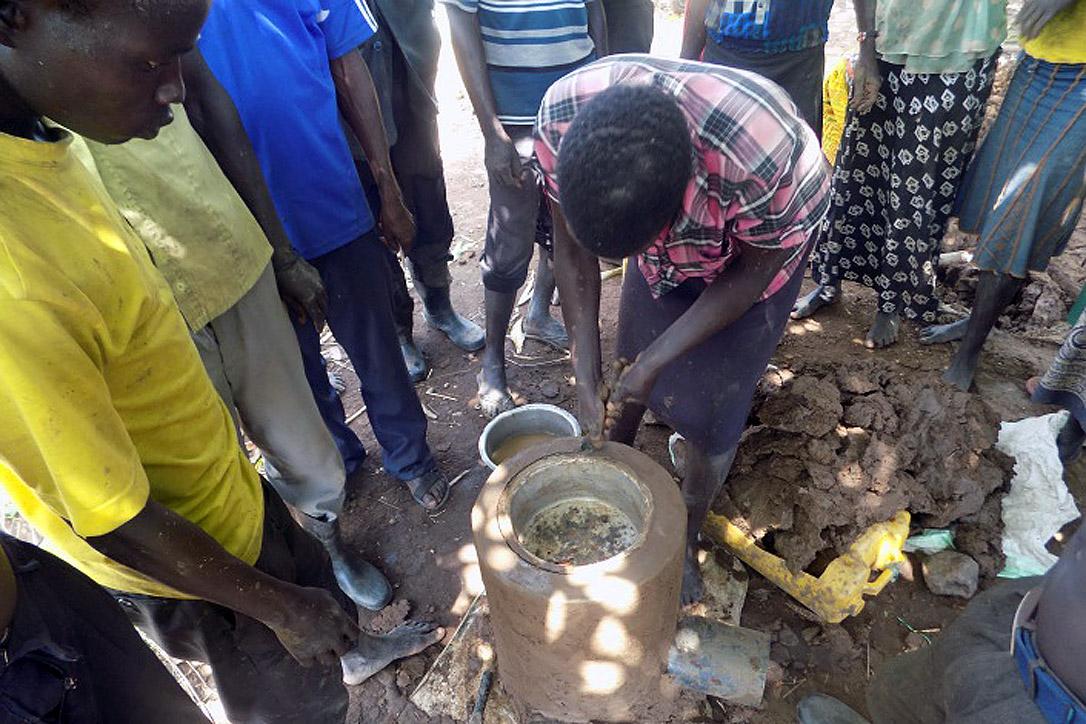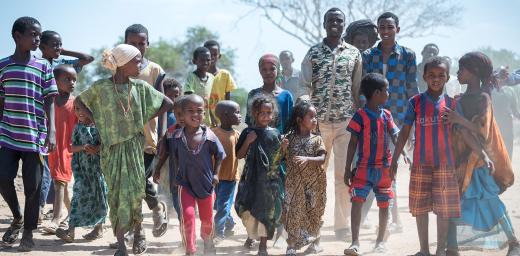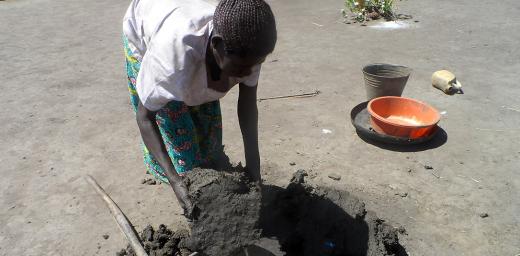Keeping the environment - and the peace

Dozens of people turned out to learn how to make energy-efficient stoves. Photo: LWF Uganda
Courses on fuel-efficiency foster peace between refugees and hosts in Uganda
(LWI) – “By the end of the day, we expect to complete four stoves,” says Drichi Godfrey, a 26-year-old refugee from South Sudan. He, his wife and the two children now live in Boroli, a refugee settlement in Adjumani district, Uganda.
Godfrey is in the first day of training 30 fellow refugees in the construction of energy-efficient stoves. “There was a lot of enthusiasm,” Godfrey says. “Not all [the people] that I have informed have come, but the 18 women and 12 men present were really eager.”
He said they actually demanded the training since he learnt the technique early this year. A workshop is a practical way of learning.
Godfrey is one of about 250,000 South Sudanese refugees in north Uganda. More than 100,000 have arrived in the last two months after an outbreak of violence in South Sudan. The large refugee settlements in Adjumani have grown and new sites have been set up. The refugees cut down trees for the construction of tukul clay and wood houses and for firewood. Both refugees and locals, cook on open fires.
Limited Resources
In large refugee settlements there are not enough resources for everyone. This leads to tension between refugees and host communities. The Lutheran World Federation (LWF) is one amongst the many humanitarian organizations helping mitigate the exhaustion of local natural resources.
Planting trees in refugee settlements and host communities is one strategy being used by LWF to support both the host communities and the refugees to reserve the environment in Adjumani District. Another is offering training in using of energy efficient technologies and practices. The training is conducted in a mixed group consisting of both the refugees from South Sudan and the host communities.
We have seen a change of attitude towards environmental protection and conservation. A great number of the people do want to plant trees and preserve the environment. Many times, all the host communities and the refugees ask for is technical and moral support.
The five day course covers topics like environmental management, the benefits of energy saving/efficient stoves, and finally the actual construction of energy-saving stoves. As the participants greatly benefit from practical instructions in their own language, the LWF approach is to train 30 people who will become trainers and share their knowledge with 30 people each in the communities. One of them is Godfrey, the South Sudanese refugee who is now starting his first workshop as a trainer.
Many benefits
To the participants on Godfrey’s course, being able to build energy efficient stoves does not only help their immediate families. “We have many benefits, some of which we will only realize after this training,” Ojaba Jackline, a 21-year-old married woman says.
“The food is ready faster than before, most of the women in my community have reduced the frequency of fetching firewood from the bush, the girls can go to school earlier. It has also lessened my work as a house wife, something not only I but many women here have observed. We are also planning to sell some of the stoves to have additional income for our family.”
LWF Project Officer for Peace building and Conflict Management in Adjumani, Edwin Odur-Luru, said staff have seen a change of attitude towards environmental protection and conservation.
“A great number of the people do want to plant trees and preserve the environment. Many times, all the host communities and the refugees ask for is technical and moral support.”
(With contribution by Edwin Odur-Luru, LWF Project Officer for Peace building and Conflict Management in Adjumani)
The project Fuel Efficient Energy Technologies and Training is supported by the United States Bureau for Population, Refugees and Migration





